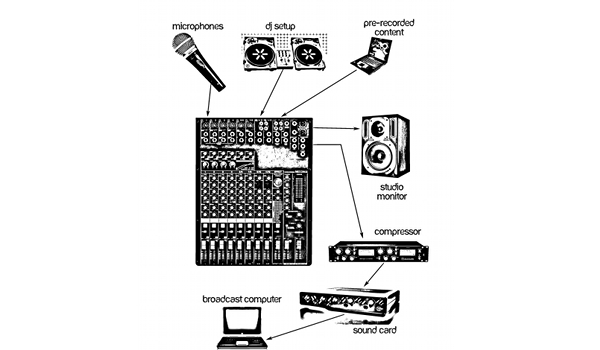Catalyst Radio is a progressive UK Internet radio network using open source radio software Airtime (which was just released as version 1.8.2) to power its message. AM Kanngieser, who is in one of the collectives founding the network, talks us through what makes the network so unique and how they’re embracing a DIT (do it together) ethos as well as open source software.

Radical radio
Catalyst Radio was initially conceived in late 2010 during a Hacktionlab convergence in Bradford, UK, by a number of radical radio producers and independent media makers, including Dissident Island (London), Radio Interference (Bradford), Radio Kebele (Bristol), Redbricks Radio (Manchester) and other independent media producers, such as Radio Vague. It was born from a desire to create a UK wide radical radio network that collectively uses a single Internet platform for the streaming of live and pre-recorded radio content presenting points of view generally diverging from those of the more established, and mainstream, media.
Given its political and techno-social foundations, Catalyst is designed to encourage and multiply independent, DIY (do-it-yourself) and DIT (do-it-together) media production, specifically radio, as well as connect and support radical radio makers and media enthusiasts. Moreover, it has been set up to be owned and operated by its community, namely those broadcasting on it, organising it, participating in it, and listening to it. As such it draws great inspiration from long term independent media projects such as Indymedia.
Remapping media terrain.
The instantiation of Catalyst was fueled by a number of reasons. The current technological and media environment provided a springboard. The past decade especially has witnessed an explosion of media production, largely propelled by greater access to cheaper, and more user friendly, media hardware and software. The increasing ability for ‘nonspecialists’ to create and upload their own media content to online platforms has remapped the media terrain, opening up a much larger playing field for the circulation of media text, audio, visuals and dynamic content.
At the same time, this proliferation has meant that there is an abundance of DIY podcasts and audiostreams for radio listeners to choose from, which can lead to the overlooking of less promoted or marginal programs. While excellent archiving repositories exist, such as Radio4All, Politube and Archive.org amongst others, it was felt that a platform for the connection of UK radical programs, as usually seen in the format of a radio station – which in this case is geographically impossible – was lacking.
On the one hand, this has been suggested to bring about connections and links between media makers, and counter feelings of alienation and isolation for radio programmers hailing from less metropolitan areas. Organisationally, because of the significant distances between those involved span across the UK, the network format was thought of as the most viable, meaning that meetings and communications can take place over an online list and an IRC chat stream, as well as a quarterly face-to-face meetings. On the other hand, the platform is seen as a means to support the wider sharing of knowledge, skills and resources.
Sharing broadcast skills
Catalyst is considered to be an ideal vehicle for radio skill-sharing and support. An awareness of the privileges, technical and organisational knowledges, education and skills of those groups and individuals instigating Catalyst underpins our commitment to mutual aid, sharing and learning. We practice an acute mindfulness around the specialisation that can occur when skills and resources crystallise in an individual or group, and the discriminations of access, differential inclusion and participation this can create and reproduce. Considerations of who has access to what kinds of media production, software and hardware resources, money, as well as the time, energy and communities to support such production, are at the forefront of the network.
For that reason, it has been determined that the network will be open for content population by any and all radio makers, or potential radio makers, who feel an affinity with the common principles of Catalyst, regardless of their experience or resources. It is also important to enable a diversity of shows and output frequencies, from regular news programming, to one off events, from chat and talkback, to DJ sets and underground music. To give new contributors a sense of the network and its operation, and to encourage new content, two statements have been written, outlining the process and guidelines of the network, including its organisation and communications, and an instruction manual of sorts on minimum broadcasting requirements, which emphasises the very basic nature of the tech required to make your own radio show.
Do it together.
The ethos of DIY, or more accurately DIT, infuses every aspect of the Catalyst process. Because most of those already involved in the network work autonomously from corporate and state funding, relying on community fundraising, the resources available are relatively low-fi, low budget and sometimes self-made. Most of the radio producers are self-taught and learn from peers and through trial and error. Open source and free software features heavily for editing and streaming purposes, and the Linux based Airtime radio automation and scheduler will be used to organise and cohere content transmission. This ethos of trying things out, learning from mistakes, embracing sharing and mutual aid, reflects the political principles of free or inexpensive access to resources, community and peer to peer learning and teaching, and an experimental and supportive environment that Catalyst enacts and will continue to enact.
Catalyst Radio launched on June 11th, 2011 at the Barncamp convergence in the Wye Valley, Wales. It is streamed from catalystradio.org.
Kanngieser A 2011 Catalyst radio: Towards a radical UK Internet radio network. Sourcefabric [Online]